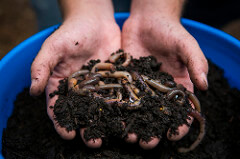
Have you ever wanted to try composting but thought that it took too long? Well now you can cut down the composting time by more than half just by using nature’s composters, worms. Using vermicomposting, you can create a nutrient dense soil conditioner for all of your organic lawn care needs, all for free! While the setup can take some time, the results are certainly worth the effort. The mechanics are very similar to a normal compost; soil, moisture, and time break down organic waste into all natural fertilizer for you to use, just with the worms speeding up the process. That fertilizer restores important vitamins and nutrients in the soil for your plants.
- To harness the power of this mini-ecosystem for your lawn, you will first need a worm bin. You can either buy a premade bin at any number of online stores or make your own out of rubber tubs or even wood. The kind of material that you’ll want if you build your own will vary depending on your location. For Atlanta, or an area like the South East, with its hot humid summers, rubber will serve you better, as wood is prone to rotting and absorbing the excess water that is important for the worms.
- The size of the box depends on how much waste you plan on composting every day, but for most people a box 10 to 15 inches deep should do. Make sure that you ventilate the box with small holes every few inches to allow proper airflow.
- Now, Atlanta organic lawn care can be difficult with just how hot it gets, and this step is one of the most important in ensuring the success of your wormery. You’ll need to keep the composting box somewhere no more than 80 degrees, in the garage or basement should suit it fine, as temperatures above that can kill the worms. If you keep it outside, make sure to keep a lid on it to prevent flooding.
Once you have a location picked and your box set up, fill the box up with some dirt and the organic waste that you want to compost. Once you add the worms you just need to sit back and let nature take its course. You should be able to harvest the fertilizer every 8 to 10 weeks while the composter is in use. Make sure to not overfeed the worms, or the waste will begin to smell, as it’s the rotten food that smells not the worms. For the worm’s diet, lots of fiber and vegetable scraps should keep your worms happy and healthy. With this knowledge and some time and effort, creating a vermicomposting bin for use with your organic lawn care or gardening should take no time at all!

